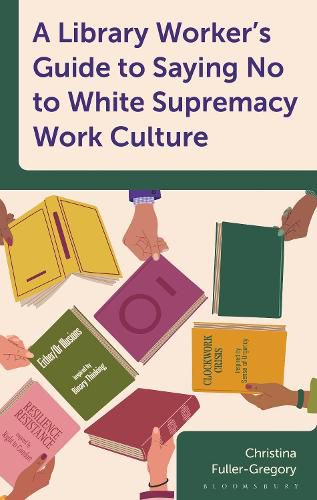Readings Newsletter
Become a Readings Member to make your shopping experience even easier.
Sign in or sign up for free!
You’re not far away from qualifying for FREE standard shipping within Australia
You’ve qualified for FREE standard shipping within Australia
The cart is loading…






A call to action to dismantle the white supremacy work culture in libraries, and create an environment where EDI is not only talked about but realized.
Are the standards of professionalism that your organization has set still serving you? Or might libraries and library workers challenge our long-held beliefs about what our work culture is or should be? A Library Worker's Guide to Saying No to White Supremacy Work Culture interrogates the historical foundations and present day consequences of a library work culture that is rooted in white supremacy. These white supremacy work culture habits show up in every aspect of library service, from programming, policy development, hiring practices, strategic planning, and even our ways of communicating and engaging. Even as libraries and library workers have been intentional in introducing and developing practices that center equity, diversity, and inclusion, the quiet intersectionality of white supremacy work culture coupled with our professional standards of librarianship have informed our internal work practices, shaping our perspectives and perceptions around what it means to be a 'good librarian.'
Library workers and libraries are already having authentic and challenging conversations about the impacts of equity, diversity, and inclusion on library services. However, these conversations are often external in nature, guided by a solidly patron-centric focus. This book challenges libraries and librarians to turn inward to examine the oppressive internal systems that libraries have developed, sustained, and promoted.
Using Tema Okun's seminal research on white supremacy culture as inspiration A Library Worker's Guide to Saying No to White Supremacy Work Culture will reimagine the reader as an active participant in both discovering and addressing how the aspects of white supremacy culture inform our library work.
$9.00 standard shipping within Australia
FREE standard shipping within Australia for orders over $100.00
Express & International shipping calculated at checkout
A call to action to dismantle the white supremacy work culture in libraries, and create an environment where EDI is not only talked about but realized.
Are the standards of professionalism that your organization has set still serving you? Or might libraries and library workers challenge our long-held beliefs about what our work culture is or should be? A Library Worker's Guide to Saying No to White Supremacy Work Culture interrogates the historical foundations and present day consequences of a library work culture that is rooted in white supremacy. These white supremacy work culture habits show up in every aspect of library service, from programming, policy development, hiring practices, strategic planning, and even our ways of communicating and engaging. Even as libraries and library workers have been intentional in introducing and developing practices that center equity, diversity, and inclusion, the quiet intersectionality of white supremacy work culture coupled with our professional standards of librarianship have informed our internal work practices, shaping our perspectives and perceptions around what it means to be a 'good librarian.'
Library workers and libraries are already having authentic and challenging conversations about the impacts of equity, diversity, and inclusion on library services. However, these conversations are often external in nature, guided by a solidly patron-centric focus. This book challenges libraries and librarians to turn inward to examine the oppressive internal systems that libraries have developed, sustained, and promoted.
Using Tema Okun's seminal research on white supremacy culture as inspiration A Library Worker's Guide to Saying No to White Supremacy Work Culture will reimagine the reader as an active participant in both discovering and addressing how the aspects of white supremacy culture inform our library work.